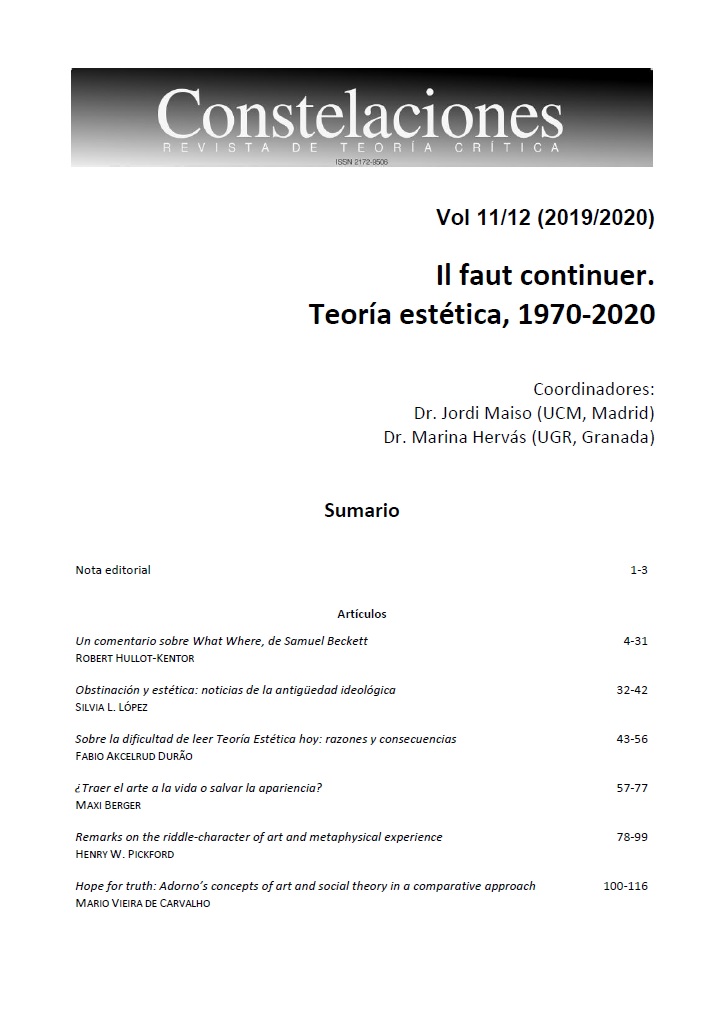On the Difficulty of Reading Aesthetic Theory Today: Reasons and Consequences
Keywords:
Th. W. Adorno, Aesthetic Theory, the contemporary, self-referenceAbstract
This article approaches the question of Th. W. Adorno’s relevance to the present by arguing that his oeuvre has become irrelevant. To its well-known layers of difficulty another must be added, the narrowing down of the horizon of what can be thought, which leads Aesthetic Theory to acquire a layer of unintelligibility. The work’s response consists in doubling its theoretical wager and attempting to itself provide the conceptual context reality denies it. The article concludes with a few considerations on the political potential of such procedure.
Downloads
References
ADORNO, Theodor W. (2004): Teoría estética, ed. de R. Tiedemann, trad. de J. Navarro Pérez. Madrid, Ediciones Akal.
ADORNO, Theodor W. (2008): “Sobre la tradición” en Crítica de la cultura y sociedad I, ed. de R. Tiedemann, trad. de J. Navarro Pérez. Obra completa, 10/1, Madrid, Akal 2008, 271-280.
ADORNO, Theodor W. (2012): Tres estudios sobre Hegel, ed. de R. Tiedemann, trad. de J. Chamorro Mielke. Obra completa, 5, Madrid, Akal.
BARTHES, Roland ([1971]1994): “De l’œuvre au texte”. In: Œuvres Complètes, vol.2. Paris, Seuil.
BARTHES, Roland ([1967] 1994 ): “La mort de l’auteur”. In: Œuvres Complètes, vol.2. Paris: Seuil.
BOURDIEU, Pierre (1979). La Distinction: Critique sociale du jugement. Paris, Minuit.
BROWN, Nicholas (2019): Autonomy. The Social Ontology of Art Under Capitalism. Durham, NC, Duke U.P.
BÜRGER, Peter (1974): Theorie der Avantgarde. Frankfurt a.M., Suhrkamp.
CACHOPO, João Pedro (2013): Verdade e Enigma. Ensaio sobre o Pensamento Estético de Adorno. Lisboa, Edições Vendaval.
DURÃO, Fabio Akcelrud (2008): Modernism and Coherence: Four Chapters of a Negative Aesthetics. Frankfurt a.M., Peter Lang.
DURÃO, Fabio Akcelrud (2011): “De volta a Adorno na interpretação da cultura”. Revista FronteiraZ, São Paulo, n. 7, deciembre.
DURÃO, Fabio Akcelrud (2013): “Variaciones acerca de los equívocos del debate sobre el canon”. Literatura: teoría, historia y crítica, v. 15, p. 187-200.
DURÃO, Fabio Akcelrud (2017): “A Imagem de Pensamento como Forma”, Pandemonium Germanicum, Sa?o Paulo, v. 20, n. 32, set.-dez., 21-34.
DURÃO, Fabio Akcelrud (2019): Do texto à obra e outros ensaios. Curitiba, Appris, 2019.
FELSKI, Rita (2015): The Limits of Critique. Chicago, Chicago U.P.
GUILLORY, John (1993): Cultural Capital. The problem of literary canon formation. Chicago, University of Chicago Press.
HARTOG, François (2012): Régimes de historicité. Paris, Seuil.
HULLOT-KENTOR, Robert (2016): “El sentido exacto en el que ya no existe la Industria Cultural”. Constelaciones. Revista De Teoría Crítica, 3, págs. 3-23.
MANSOUR, Chris (2016). “Praxis, teoría y lo irrealizable: Una entrevista con Robert Hullot-Kentor”. Constelaciones. Revista De Teoría Crítica, 5, 336-351.
n+1, editores. “Too Much Sociology”, vol. 16, Spring 2013.
RICHTER, Gerhard (2007): Thought-images: Frankfurt School Writers' Reflections from Damaged Life. Stanford, Stanford U.P., 2007.
SAFATLE, Vladimir (2019): Dar Corpo ao Impossível. O sentido da dialética a partir de Theodor Adorno Belo Horizonte, Autêntica.
Published
How to Cite
Issue
Section
License
Authors who have publications with this journal accept the following terms:
1. Authors will retain their copyright and grant the journal the right of first publication of their work, which will be simultaneously subject to the License of recognition of Creative Commons CC BY-NC-SA 4.0 that allows third parties to share, redistribute and adapt the work provided it is for non-commercial purposes and its author and first publication in this journal is indicated.
2. Authors may adopt other non-exclusive distribution license agreements for the version of the published work (e.g., depositing it in an institutional electronic archive or publishing it in a monographic volume) provided that the initial publication in this journal is indicated.
3. Authors are permitted and encouraged to disseminate their work via the Internet (e.g., in institutional telematic archives or on their website) before and during the submission process, which can produce interesting exchanges and increase citations of the published work. (See The Effect of Open Access).
Data confidentiality
1. Constelaciones. Revista de Teoría Crítica guarantees that the data you send us will only be used to meet the requests made in this message.
2. Your data will not be passed on to third parties.
3. You may request that your data be removed from our records at any time.





